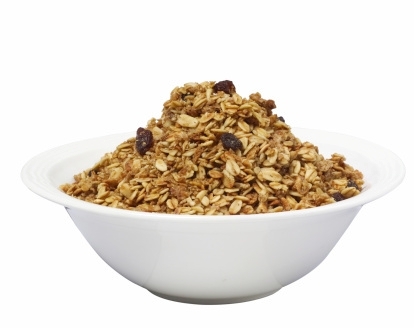9 Inflammation-Fighting Vitamins & Minerals (And Where You Can Get Em)

Some vitamins, minerals, and antioxidants are particularly useful in our fight against inflammation. Here’s a list of some of the phytonutrients that should always be part of your life.
1. Vitamin A & Provitamin A
Beta-carotene is a provitamin that converts to vitamin A in the body. Vitamin A is also an antioxidant that helps protect the body against free radicals. We can boost the vitamin A in our bodies by eating a wide range of vegetables including broccoli, carrots, dandelion, spinach, cantaloupe, kale, sweet potato, and collard greens.
2. Vitamin B
People who have low levels of vitamin B6 tend to have high levels of C-reactive protein, which is a measure of inflammation within the body. Vegetables that are high in B vitamins, including B6, include mushrooms, kale, broccoli, cauliflower, and bell peppers. Animal sources include turkey, chicken, cod, and tuna.
Folate (folic acid) is another B vitamin associated with inflammation. A short study in Italy suggests that even a low-dose, short-term daily folic acid supplement could reduce inflammation in people who are overweight. Good sources of folate include black-eyed peas, lima beans, chickpeas, dark leafy greens, and asparagus.
3. Vitamin C
A large number of studies show the anti-inflammatory benefits of foods that are high in the antioxidant vitamin C. Good lower sugar sources include tomatoes and tomato juice You can also find vitamin C in many other fruits with a low to moderate sugar content including grapefruit and lemons. Try starting your day drinking water and lemon juice, which will give your vitamin C a morning boost.
4. Vitamin D
Vitamin D helps reduce inflammation and insufficient vitamin D is associated with a range of inflammatory conditions. In combination with calcium, vitamin D also promotes weight loss. There are estimates that say that two-thirds of the population in the United States is vitamin D deficient. We get vitamin D naturally when we are out in the sun. In addition, we get it in foods such as fish, egg yolks, and organ meats. It’s also found in foods that have been supplemented with vitamin D, such as milk.
5. Vitamin E
This is another antioxidant vitamin that can help reduce inflammation. We find vitamin E naturally in nuts and seeds, including almonds and sunflower seeds, as well as in vegetables such as spinach and fruits like avocado.
6. Vitamin K
Vitamin K can help reduce inflammatory markers; research shows that it may help protect against heart disease, as well as osteoporosis. Very few of us are getting enough vitamin K in our diets. There are two types of vitamin K: vitamin K1, which we find in leafy vegetables like kale, cabbage, cauliflower, and spinach; and vitamin K2, which is found in liver and eggs.
7. Coenzyme Q10
This is an antioxidant that appears to have anti-inflammatory properties. We can find it naturally in sardines, mackerel, salmon, beef liver, olive oil, walnuts, peanuts, parsley, broccoli, avocado, and spinach.
8. Glutathione
Another antioxidant and free-radical fighter with anti-inflammatory properties (free radicals are unstable atoms or groups of atoms that can cause cell damage), glutathione can be found naturally in asparagus, avocados, spinach, garlic, tomatoes, grapefruit, apples, and milk thistle.
9. Magnesium
This is mineral can help reduce inflammation. Low magnesium is associated with high stress. Stress, as most of us know, can trigger cravings for foods such as chocolate or other refined carbohydrates. Stress also alters dopamine levels in the brain, and dopamine is a magnesium-dependent neurotransmitter. It’s estimated that 70 percent of all Americans are deficient in magnesium. This is an amazing statistic because magnesium is found in a large variety of foods, including dark leafy vegetables such as spinach, avocado, almonds, and many legumes. A magnesium deficiency is particularly common among men and women who are overweight That many of us are not getting enough of this mineral speaks to the poor quality of nourishment that exists in many of our lives.
Excerpt from How to Fight FATflammation © 2015 by Lori Shemek, M.D. Reprinted with permission from HarperOne.
Photo Credit: Stocksy
-
Excerpt: Body Intelligence: Lose Weight, Keep It Off, and Feel Great About Your Body Without Dieting!
Supersize That? The idea that eating a large amount of food is an a
-
Fresh Fruit Helps Fast Weight Loss
Can you lose weight as part of a fitness exercise program just by e
-
Tips for Quick Weight Loss
Though a quick weight loss program is ge
-
Does Pure Garcinia Cambogia Extract Actually Work? - Learn More About It
Raise your hand if youve ever wanted to lose some weight. For a lot of
-
Which Procedure Is Perfect for You? Liposuction or Tummy Tuck
A lot of people especially women have de
-
Lose Weight with the Diet Solution Program
The Weight loss program Solution Program is without doubt one of th
- DON'T MISS
- Chiropractic Wellness
- How to Get Motivated To Lose Weight?
- What do you need to find out concerning the Dukan Diet program to get quick fat loss
- Weight Loss Pills Are They Safe
- The 3 Most Effective Weight Loss Plans
- How To Choose A Weight Loss Program
- The American Diet Is It Good For You?
- Do You Think Your Food Is Making You Sick?
- Women Shouldn抰 Be Afraid of Weight Training and Supplements (Exercise, weight training, weight loss
- Lose Weight and Eat Well on $6 a Day




